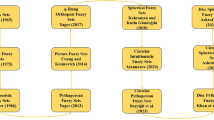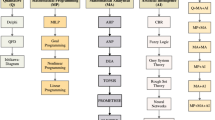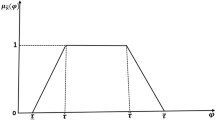Abstract
There exist two classes of problems, which need the use of a multicriteria approach: problems whose solution consequences cannot be estimated with a single criterion and problems that, initially, may require a single criterion or several criteria, but their unique solutions are unachievable, due to decision uncertainty regions, which can be contracted using additional criteria. According to this, two classes of models (〈X,M〉 and 〈X,R〉 models) can be constructed. Analysis of 〈X,M〉 and 〈X,R〉 models (based on applying the Bellman-Zadeh approach to decision making in a fuzzy environment and using fuzzy preference modeling techniques, respectively) serves as parts of a general scheme for multicriteria decision making under information uncertainty. This scheme is also associated with a generalization of the classic approach to considering the uncertainty of information (based on analyzing payoff matrices constructed for different combinations of solution alternatives and states of nature) in monocriteria decision making to multicriteria problems. The paper results are of a universal character and are illustrated by an example.
Similar content being viewed by others
References
Antunes C, Dias L (2007) Editorial: Managing uncertainty in decision support models. Eur J Oper Res 181:1425–1426
Beliakov G, Warren J (2001) Appropriate choice of aggregation operators in fuzzy decision support systems. IEEE Trans Fuzzy Syst 9:773–784
Bellman R, Giertz M (1974) On the analytic formalism of the theory of fuzzy sets. Inf Sci 5:149–157
Bellman RE, Zadeh L (1970) Decision-making in a fuzzy environment. Manag Sci 17:141–164
Belyaev L (1977) A practical approach to choosing alternative solutions to complex optimization problems under uncertainty. IIASA, Laxenburg
Bernardes P, Ekel P, Parreiras R (2009) A new consensus scheme for multicriteria group decision making under linguistic assessments. In: Mathematics and mathematical logic: New research. Nova Science, Houppauge (in press)
Berredo RC, Ekel PYa, Galperin EA, Sant’anna AS (2005) Fuzzy preference modeling and its management applications. In: Proceedings of the international conference on industrial logistics. Montevideo, pp 41–50
Berredo RC, Canha LN, Ekel PYa, Ferreira LCA, Maciel MVC (2008) Experimental design and models of power system optimization and control. WSEAS Trans Syst Control 8:40–49
Canha L, Ekel P, Queiroz J, Schuffner Neto F (2007) Models and methods of decision making in fuzzy environment and their applications to power engineering problems. Numer Linear Algebra Appl 14:369–390
Dubov YuA, Travkin CI, Yakimetc VN (1986) Multicriteria models for forming and choosing system alternatives. Nauka, Moscow
Ehrgott M (2005) Multicriteria optimization. Springer, Berlin
Ekel PYa (1999) Approach to decision making in fuzzy environment. Comput Math Appl 37:59–71
Ekel PYa (2002) Fuzzy sets and models of decision making. Comput Math Appl 44:863–875
Ekel PYa, Galperin EA (2003) Box-triangular multiobjective linear programs for resource allocation with application to load management and energy market problems. Math Comput Model 37:1–17
Ekel PYa, Schuffner Neto FH (2006) Algorithms of discrete optimization and their application to problems with fuzzy coefficients. Inf Sci 176:2846–2868
Ekel PYa, Terra LDB (2002) Fuzzy preference relations: methods and power engineering applications. Opsearch 39:34–45
Ekel P, Pedrycz W, Schinzinger R (1998a) A general approach to solving a wide class of fuzzy optimization problems. Fuzzy Sets Syst 97:49–66
Ekel PYa, Terra LDB, Junges MFD, Moraes MA, Popov VA, Prakhovnik AV, Razumovsky OV (1998b) Multicriteria power and energy shortage allocation using fuzzy set theory. In: Proceedings of the international symposium on bulk power systems dynamics and control IV: restructuring. Santorini, pp 311–318
Ekel PYa, Junges MFD, Morra JLT, Paletta FPG (2002) Fuzzy logic based approach to voltage and reactive power control in power systems. Int J Comput Res 11:159–170
Ekel PYa, Martins CAPS, Pereira Jr JG, Palhares RM, Canha LN (2006a) Fuzzy set based allocation of resources and its applications. Comput Math Appl 52:197–210
Ekel PYa, Silva MR, Schuffner Neto F, Palhares RM (2006b) Fuzzy preference modeling and its application to multiobjective decision making. Comput Math Appl 52:179–196
Ekel PYa, Menezes M, Schuffner Neto FH (2007) Decision making in fuzzy environment and its application to power engineering problems. Nonlinear Anal, Hybrid Syst 1:527–536
Ekel P, Queiros J, Parreiros R, Palhares R (2009) Fuzzy set based models and methods of multicriteria group decision making. Nonlinear Anal 71:409–419
Fodor J, Roubens M (1994) Fuzzy preference modelling and multicriteria decision support. Kluwer Academic, Boston
Hodges J Jr, Lehmann E (1952) The use of previous experience in reaching statistical decision. Ann Math Stat 23:396–407
Kuchta D (2007) Choice of the best alternative in case of a continuous set of states of nature—application of fuzzy numbers. Fuzzy Optim Decis Mak 6:173–178
Lu J, Zhang G, Ruan D, Wu F (2007) Multi-objective group decision making: methods, software and applications with fuzzy set techniques. Imperial College Press, London
Luce R, Raiffa H (1957) Games and decisions. Wiley, New York
Orlovski SA (1978) Decision making with a fuzzy preference relation. Fuzzy Sets Syst 1:155–167
Orlovsky SA (1981) Problems of decision making with fuzzy information. Nauka, Moscow (in Russian)
Pareto V (1896) Cours d’économie politique. Lausanne Rouge, Lausanne
Pedrycz W, Gomide F (1998) An introduction to fuzzy sets: analysis and design. MIT Press, Cambridge
Raiffa H (1968) Decision analysis. Wesley, Reading
Rao SS (1996) Engineering optimization. Wiley, New York
Raskin LG (1976) Analysis of complex systems and elements of optimal control theory. Sovetskoe Radio, Moscow (in Russian)
Sobol’ IM (1979) On the systematic search in a hypercube. SIAM J Numer Anal 6:790–793
Trukhaev RI (1981) Models of decision making in conditions of uncertainty. Nauka, Moscow (in Russian)
Wen M, Iwamura K (2008) Fuzzy facility location-allocation problem under the Hurwicz criterion. Eur J Oper Res 184:627–635
Yager RR (1988) On ordered weighted averaging operators in multicriteria decision making. IEEE Trans Syst Man Cybern 18:183–190
Yager RR (1996) Fuzzy set methods for uncertainty representation in risky financial decisions. In: Proceedings of the IEEE/IAFE conference on computational intelligence for financial engineering. New York, pp 59–65
Yu PL (1985) Multiple criteria decision making: concepts, techniques, and extensions. Plenum, New York
Zimmermann HJ (1990) Fuzzy set theory and its application. Kluwer, Boston
Author information
Authors and Affiliations
Corresponding author
Rights and permissions
About this article
Cite this article
Ekel, P., Kokshenev, I., Palhares, R. et al. Multicriteria analysis based on constructing payoff matrices and applying methods of decision making in fuzzy environment. Optim Eng 12, 5–29 (2011). https://doi.org/10.1007/s11081-010-9108-0
Received:
Accepted:
Published:
Issue Date:
DOI: https://doi.org/10.1007/s11081-010-9108-0




